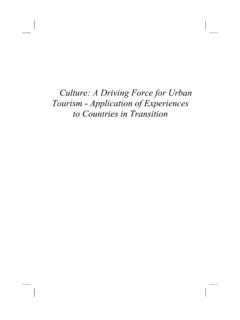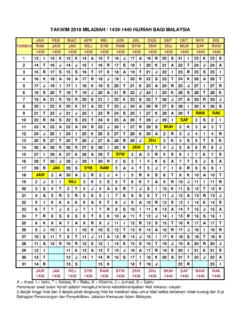Transcription of The Perception of Islam and Muslims in the Media …
1 The Perception of Islam and Muslims in the Media and the Responsibility of European Muslims Towards the Media Mirza ME I , Imam, Professor of Islamic History at the Zagreb Madrasah, Zagreb Mosque, Zagreb, Croatia Global and regional political, economic and social development, in recent years, has troubled the relationship between Western, European and Islamic societies strongly and manifold. Throughout the world, people are witnessing unsettling changes. Non- Muslims and Muslims alike became victims of terror and violence by people pretending to act "in the name of Islam ".
2 Misunderstanding and prejudice seem to grow on both sides even though information systems and means of communication are highly sophisticated. In the era of communication, wars begin, continue and end with Media war. The Media shapes public opinion and covers realities by their censorship. The mass Media are used as the most important weapon. There is a connection between the role of Media and post-modernity. The Media shapes the world how we see it. It is a common observation that crises such as wars, recessions, stock market meltdowns, ethic scandals, and natural catastrophes often drive the public policy making process.
3 A crisis reveals a problem and then a public consensus emerges that policymakers must do something about it (Snider2006:1).These crises reveal broadcasters' important role in communicating crisis information. They provide emerging information to the public in times of crisis. But choosing negative and frightening names for people or groups that powerful policymakers dislike, or using positive names for describing wildly acts - are parts of Media tricks. Nowadays, numerous Media campaigns are going on against Islam and Muslims . Most Western Media with considerable financial resources and multiple channels try to show a rough picture of Islam to their public.
4 At the same time muslim groups through various Media outlets are trying to convey their messages, but in comparison to the global dominance of the western Media , their efforts are somehow in vain. In this regard you can visit the website of the Islamic community in Croatia and many others. Most western Media are using the September 11th event to capitalize its political gain. These Media depict Islam as "fundamentalism", "extremism" and "radicalism". Of course, in the modern world where the role of Media is central, the image of reality can be manipulated to misrepresent the actual facts.
5 The Media have tried to represent Muslims as "terrorists" posing a threat to the western security. By doing so, they try to justify the wars in Afghanistan and Iraq. In recent years, this approach has led to the emergence of "Islamophobia". However, little effort has been made to respond to these negative campaigns. On the contrary, the act of terrorist groups who kill people, especially western hostages, help their Media to show that they are collectively victims of terrorism. Despite the explosion of Media coverage and publications on Islam and Muslims , the major challenge today involves getting accurate and verified information.
6 The politicization of scholars, experts and Media commentators in the post 9/11 period has created a minefield for policymakers and the general public as they search for answers to questions like: What are the causes of radicalism and anti-Americanism? , Why do they hate us? , What do muslim 1. women think about their status in Islam ? Is Islam compatible with democracy? , What are the causes of global terrorism? and many others. Too often, a reader is caught between the contending positions of seemingly qualified experts as well as a new cadre of Islamophobic authors who engage in a revisionist reading of Islam and Islamic history.
7 So, what we should do? Suddenly a new empirically grounded tool emerged to get us beyond the limited interpretations and opinions of experts when answering the question: What do Muslims think and what do they care about? The sense of threat to the muslim cultural identity is enhanced by a predominant feeling that a secular and powerful West imposes its values upon the muslim world. When asked the open- ended question, In your own words, what do you resent most about the West? , the most frequent response across all Islamic countries for both moderates and political radicals was sexual and cultural promiscuity ; followed by ethical and moral corruption and hatred of Muslims .
8 Another source of resentment comes from the depiction of Muslims in the Western Media . A survey by Jack Shaheen in his book, Reel Bad Arabs: How Hollywood Vilifies a People, found that the vast majority of Arab characters in 900 American films were outright racist characters. Images of common day life and ordinary Muslims in their countries are almost non-existent or distorted in the western Media . Moreover, the western Media which are most popular in the muslim world encourage emulation of Western fashion, personalities and values. TV news are the most important source of public knowledge about world events.
9 Approximately 80 percent of population relies on it as their main source of news (Philo and Berry2006:199).Western Media with considerable financial resources try to show a rough picture of Islam to their public. Some scholars believe that there is a direct connection between terrorism and modern global communication. Their studies show that most terrorists' acts are propaganda. Terrorism is an indirect psychological strategy which avoids direct contact with opponents. So, without Media coverage terrorism disappears. After 9/11 the terms " muslim " and "Terrorist" became synonymous in many western countries.
10 Since this event, many experts and activists in the field of human rights have warned of the escalation of Islamophobia and racism against Muslims in many western countries. The representation of Muslims in the Media relates to the lack of acceptance of differences. The Media creates public panic around the terrorist threat. As one scholar said the War on Terrorism is a war of images, and the most effective images are those of terrorists' victims. But on the other side we see discrimination associated with "Islamophobia". This phenomenon tries to show that Muslims are a threat to security.








